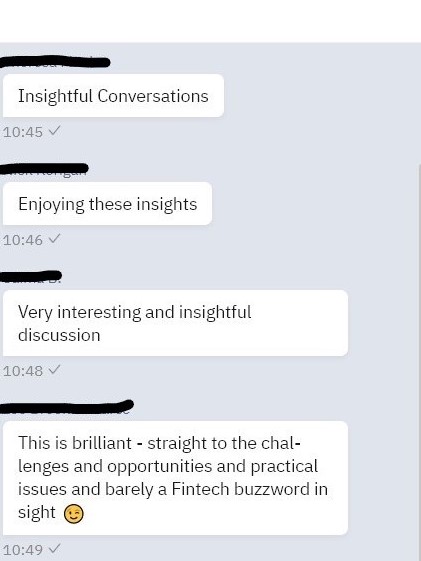Coopetition is an uncommon phrase that leaves many wondering if you made a typo, however, coopetition has its own meaning that is extremely prevalent in the fintech space: it describes the competition and simultaneous collaboration between two companies. In the financial technology world, the term is commonly associated with big banks and big tech companies, i.e fintechs. Fintech Week London has been a huge success as the UK holds its first in-person fintech event since the pandemic began, and within it held a panel titled “Big Tech and Big Banks: Coopetition” that aimed to dismantle the term and delve into the evolution of how banks and fintechs have been able to help one another whilst remaining competitive.
The panel consisted of a full female cast including, Joanna Dewar, CEO of Global Processing Services, Leda Glyptis, Chief Client Officer at 10x Future Technologies, Kate Rosenshine, Global Cloud Lead at Microsoft, and Adizah Tejani, Partnerships and Product Innovation at HSBC. The moderator was Joy Macknight, editor at The Banker.

The panel kicked off with Rosenshre discussing recent partnerships between techs and banks. She finished with, “Both tech companies and banks, and I think the entire financial services ecosystem start to think differently and are able to get more creative, more competitive and ultimately create new and different kinds of services by embracing these partnerships.”
The conversation moved onto the competitive environment between tech companies and banks. Tejani said, “We have to make sure that we keep our customers safe regardless of what technology partnership we are looking at. We need to make sure that we consider the risks of that, and we need to make sure that we are compliant to all of the different stakeholders that we have to be compliant with across the world. But that doesn’t mean we aren’t thinking about how we push forward in different areas as well.” Though technology is great and helps many, Tejani reiterated, “we need to remember that there are still customers that need the bricks and mortars availability of our services as well” but that technology could enable this access.
Glyptis added to this idea by saying, “As banks we know how to do this [compete in different parts of the value chain], we’ve been doing it for decades, we just haven’t been doing it in this. As the fintech world is coming of age, they’re also that its possible and you don’t need to have binary relationships like you either love me or you hate me. That’s a fantastic coming of age, it’s complex, but it’s good.”
The line between competition and collaboration
When discussing the type of mindset that banks needed about partnering with fintechs as the fine line between competition and collaborator blurred, Glyptis said, “There isn’t a clear line between collaborator and competitor, your client might be your competitor in another part of the value chain. Banks have been used to doing this and now also have this with big tech.”
The topic of conversation moved on to challenger banks, and what they need to be profitable and successful. After dissecting what makes a challenger bank run, Glyptis concluded with “it is vital we ask these questions without cutting the runway that these businesses need, but at the same time, if they’re not profitable businesses that can stand on their own two feet, then the experiment [of challengers] has failed.”
Deware added to this point by pointing out the age demographics the pandemic affected. “When you look at the pandemic and the saving habits and the generation that was hit the most; it wasn’t the older generation statistically speaking, but the younger generation… most startups are not profitable in the first 10 years because they’re building and investing… but I do think from I’m seeing in global trends, there is a comfort of the younger generation to do everything online: do it through an app and pick and choose the services they want from a specific provider. Are we there yet? Probably not, but I think that’s going to be the way forward.”
Tajani also emphasised the importance of inclusion when discussing demographics. “It might sound old school to some of us, but actually we need to make sure that we service journeys for a customer base which broad and diverse, and that we don’t just get paralysed into thinking that there’s only one type of customer because banking is a core service of our economy.”
This inspired Glyptis to bring three key points to the discussion. The first was “incumbents are learning and learning fast. Everything that was brand new – incumbents are learning.” The second was that not all bright eyed and hopeful companies with good ideas succeed. “There isn’t enough funding space and consumer share for everybody.” She implied that these entrepreneurial companies were accelerating the learning of established incumbents. Rosenshire against argued this point however, saying some companies “do have a legacy, but they don’t want an IPO, they want a HSBC type company to buy them.”
Glyptis also said, “Just because there is new stuff coming through doesn’t necessarily mean that the seats around the table will change. There are two big reasons for this: one is sustainable growth is difficult, and the second, is that the regulatory expectation of big banks is that you will serve the unprofitable segments of society, but every bank struggles with the fact the elderly are the highest touch customer but the lowest value. Do we want as taxpayers want that to be a commercial choice our banks ever make? No.” She went on to explain how banks, or challenger banks, creating a niche area to help a specific part of the community raises the bar on learning for others. “I’m excited to see those community-driven banks that say ‘you know that my identity is: you and people like you, but not at the expense of others.'”
The panellists’ discussion of big banks adoption of fintech and coopetition garnered huge support from those watching Fintech Week London online:

For more insights on the rest of the day’s panels, click here.



